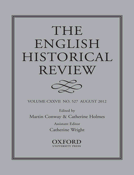-
Views
-
Cite
Cite
Peter J. Beck, The Primacy of Foreign Policy in British History, 1660–2000: How Strategic Concerns Shaped Modern Britain, ed. William Mulligan and Brendan Simms, The English Historical Review, Volume 127, Issue 527, August 2012, Pages 1008–1009, https://doi.org/10.1093/ehr/ces164
Close - Share Icon Share
Extract
Leopold von Ranke frames The Primacy of Foreign Policy in British History 1660–2000 because of his claim that recent German history should be viewed primarily as the story of foreign relations. For von Ranke, the demands of state security—what became known as the Primat der Aussenpolitik (primacy of foreign policy) which required the state to mobilise all its resources for self-preservation—took priority. During the 1960s this thesis was gradually pushed aside by Fritz Fischer and Hans-Ulrich Wehler, among others, who pressed an alternative Primat der Innenpolitik (primacy of domestic policy) view.
However, more recently in 2003, when offering an overview of essays published in a special issue of the journal German History (vol. xxxi, no. 3 [2003]), Brendan Simms detected a revival of the original Rankean line. For Simms, these essays, like Klaus Hildebrand’s then recently-published Das vergangene Reich: Deutsche Aussenpolitik von Bismarck bis Hitler 1871–1945 (1995), established that foreign policy mattered most to those in power. Now Simms has joined with William Mulligan, one of the journal’s contributors, to co-edit this book. Their stated aim is to investigate the extent to which, if at all, the Primat der Aussenpolitik concept offers ‘a tool for understanding the broad thrust of British history since the late seventeenth century’ (p. 3), most notably the extent to which internal developments were driven by foreign policy and strategic concerns. A secondary objective is to move on from the traditional tendency of historians to treat domestic and foreign affairs in isolation rather than as interrelated subjects. The editors have no intention of producing a history of British foreign policy since 1660.



